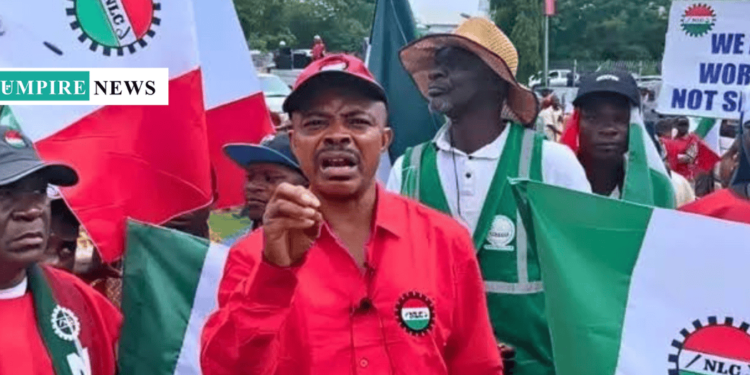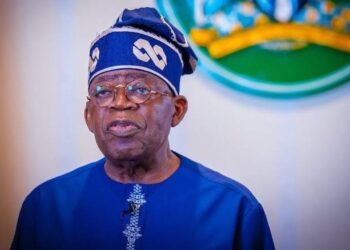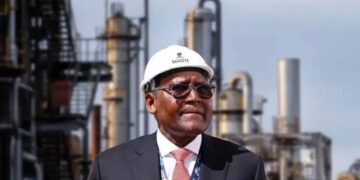The Nigeria Labour Congress (NLC) has issued a firm ultimatum to state governments, setting a December 1, 2024, deadline for the implementation of the new minimum wage. This directive comes after a National Executive Council (NEC) meeting, where the NLC resolved to take drastic measures if states fail to comply.
The union has warned that it will mobilize its members for an indefinite strike in any state that has not adopted the newly approved minimum wage of N70,000 by the deadline.
In July 2024, President Bola Tinubu announced a significant increase in the national minimum wage, raising it from N30,000 to N70,000. This move was part of efforts to address the rising cost of living and to cushion the economic hardship faced by Nigerian workers due to inflation and the recent fuel subsidy removal.
However, despite the federal government’s directive, many states are yet to implement this wage adjustment. While some states have made commitment and others have gone beyond the federal mandate by pledging to pay even higher amounts, the NLC expressed concern over the slow pace of adoption across the country.
The NLC’s ultimatum reflects growing frustration among Nigerian workers, who continue to struggle with soaring inflation, increased cost of living, and widespread poverty. In its communiqué, the NLC highlighted the dire economic conditions affecting the average Nigerian and criticized state governments for their lack of urgency in implementing the wage increase.
The union argued that a swift adoption of the new minimum wage is crucial to alleviating the financial burden on workers and providing much-needed relief amidst the current economic crisis.
The NLC also used the NEC meeting to spotlight the issue of inflated petrol prices, accusing fuel marketers of manipulating the market to the detriment of Nigerian consumers.
According to the NLC, the current pump price of petrol is significantly higher than its actual market value, leading to increased hardship for Nigerians. The union alleged that a cartel of “fat cats” in the oil industry, along with vested interests, is responsible for the inflated prices, which it claims are far above what should be charged based on global oil prices and local production costs.
The NLC further criticized the continued reliance on imported refined petrol, arguing that this is a major factor behind the artificial high prices. The organization called for an immediate revival of domestic refineries in Port Harcourt, Warri, and Kaduna, which have been non-functional for years. According to the NLC, revamping these refineries would significantly reduce the cost of petrol and ensure a more stable supply, ultimately benefiting the Nigerian economy and its citizens.
The union’s statement also touched on the ongoing controversy between independent fuel marketers and the Dangote Group, suggesting that there may be collusion to maintain high prices and prevent the entry of locally refined petrol into the market.
Given the current economic challenges, the NLC has decided to intensify its efforts to push for full implementation of the new wage across all states. It has set up a National Minimum Wage Implementation Committee to oversee the process and ensure compliance.
This committee is tasked with conducting a nationwide assessment and mobilization campaign to educate workers and the general public on the importance of the new minimum wage. The NLC emphasized that this is not just a fight for higher wages but a broader struggle for economic justice and the protection of workers’ rights.
The NLC’s planned mobilization efforts will focus on raising awareness about the new minimum wage and galvanizing support among workers. It aims to educate its members on the necessity of resisting policies and practices that undermine their economic welfare.
The union also plans to engage with civil society organizations and other stakeholders to build a broad coalition in support of its demands. The NLC’s goal is to ensure that the minimum wage increase is implemented uniformly across all states, preventing any state from opting out or delaying its adoption.
State governments that are yet to comply with the minimum wage directive face the prospect of industrial action from December 1, 2024. The NLC has directed its state councils to prepare for an indefinite strike if the new wage is not implemented by the deadline.
This strike is expected to involve workers from various sectors, potentially leading to significant disruptions in public services across non-compliant states. The union’s stance reflects its determination to hold state governments accountable for their commitments to Nigerian workers.
The issue of the new minimum wage comes at a time of heightened economic strain in Nigeria. Rising inflation, a depreciating currency, and recent fuel price hikes have significantly eroded the purchasing power of the average Nigerian worker. Many households are struggling to afford basic necessities and the economic situation has led to widespread discontent.
The NLC’s call for immediate action is aimed at mitigating these challenges and providing some relief to workers who are bearing the brunt of the current economic policies.
In addition to wage issues, the NLC’s communiqué also addressed the broader economic context, criticizing what it described as “anti-people” policies by the government. The union argued that recent government decisions, particularly regarding fuel pricing and subsidies, have exacerbated the financial difficulties faced by ordinary Nigerians.
It called for a comprehensive review of these policies to ensure they align with the interests of the people and contribute to economic stability and growth.





































